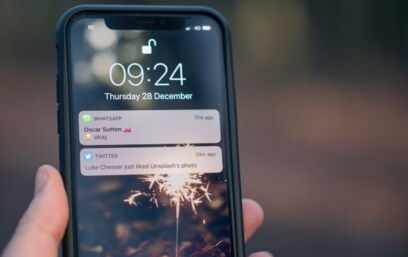Readers' Tip: Using push notifications is just one reason for deploying a mobile app. In this blog post, we provide you with a total of 7 good reasons why an app makes sense for your business.

How to Use Push Notifications for Your Marketing Strategy
What are Push Notifications and Why Should You Use Them?
Push notifications are notifications that can be sent from a mobile app to smartphone users who have installed the app. The notifications are sent from a remote server and appear as popup notifications on the recipient's smartphones, similar to receiving a new WhatsApp message or similar.
The fact that using push notifications requires the installation of the corresponding app is not necessarily a bad thing. It ensures that the notifications reach the right target audience, minimizing wastage. This is particularly true when using your mobile app as an additional sales channel for your shop. In this case, existing customers are likely to be the ones using your app, and they are more likely to be interested in receiving updates on current offers, new products, or similar information. This form of communication can also be beneficial for manufacturers offering mobile apps to companies that regularly purchase their products.
With push notifications, your customers have the flexibility to decide how and when they want to receive notifications. They can choose to receive notifications as a sound signal, vibration, or simply as a symbol. Hardly any other marketing instrument offers such freedom to the recipients. On the other hand, push notifications give you as the sender ample control over when and how they are sent. For example, you can schedule notifications to be sent at specific times, when a certain action is taken in the app, or within a specific geographical area.
The value of push notifications as an engagement and remarketing tool becomes apparent when you succeed in reactivating your customers at a time when they had not planned to use your app.
Advantages of Push Notifications:
- Precise targeting of audiences
- Flexible notification options
- Time and situation-specific targeting
- Increased engagement
Examples of Push Notifications
Now that you know the main reasons for using push notifications and how to optimize them, let's explore some application scenarios:
Say "Hello"
A friendly greeting often helps to break the ice. This also applies to the business context: Customers feel appreciated when they receive attention and are put in a positive mood. Therefore, push notifications can be used, for example, to welcome new users after a successful app installation. The joy is even greater if you accompany the greeting with a small welcome gift, such as a discount on their next purchase.
Inform About Your Products
This form of push notification is probably the most obvious: You can send short text messages to draw attention to product updates. Let your customers know that a highly sought-after item is back in stock, promote discount offers, or inform them about product launches.
Minimize Cart Abandonment
Sending push notifications can also be done for retargeting purposes. If a visitor has already added products to their cart but not completed the purchase, they can be reminded to do so. This can help reduce your cart abandonment rates.
Use Our OXID eShop App
ESYON has developed the OXID eShop App as a mobile channel for the stable OXID eShop system. The app supports offline functionality, the use of the barcode scanner for creating shopping carts, and much more. Out of the box, all standard functions of OXID can be utilized. We are happy to support you in the individual development and creation of a mobile app for your omnichannel strategy.
array(8) {
["@type"]=>
string(11) "NewsArticle"
["identifier"]=>
string(17) "#/schema/news/157"
["headline"]=>
string(57) "How to Use Push Notifications for Your Marketing Strategy"
["datePublished"]=>
string(25) "2023-07-18T12:08:00+02:00"
["url"]=>
string(63) "/news/how-to-use-push-notifications-for-your-marketing-strategy"
["description"]=>
string(328) "When used correctly, push notifications can be an effective tool for an efficient marketing strategy. However, as with many marketing tactics, the key is finding the right balance. In this article, we will explore the benefits of push notifications and how you can use them for your business with the help of our OXID eShop App."
["author"]=>
array(2) {
["@type"]=>
string(6) "Person"
["name"]=>
string(13) "Steffi Greuel"
}
["image"]=>
array(6) {
["@type"]=>
string(11) "ImageObject"
["caption"]=>
string(0) ""
["contentUrl"]=>
string(67) "/assets/images/y/pushnachrichten-nutzen-670x415-hd00bfedcy2r6kt.jpg"
["identifier"]=>
string(51) "#/schema/image/0a9da292-ef43-11ed-9dc1-03dc47cc2e7f"
["license"]=>
string(0) ""
["name"]=>
string(0) ""
}
}